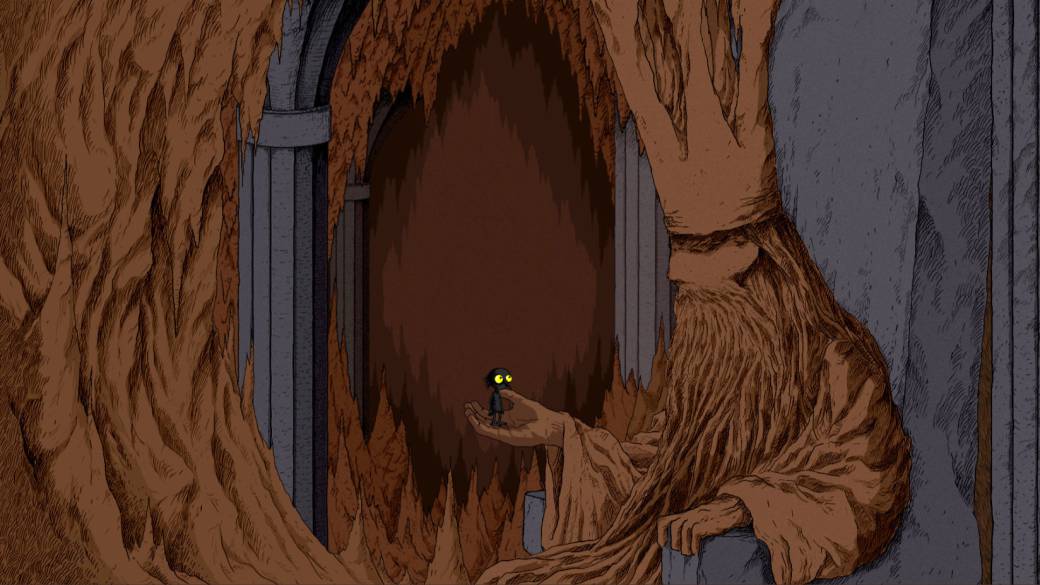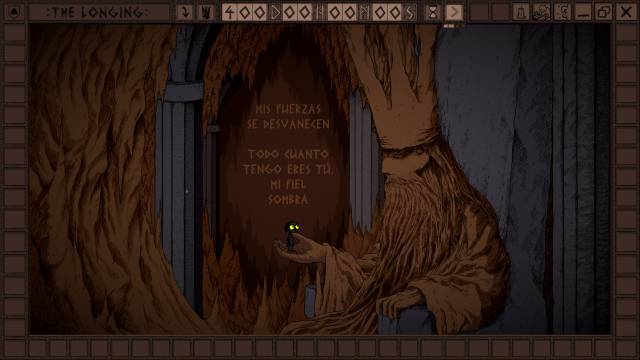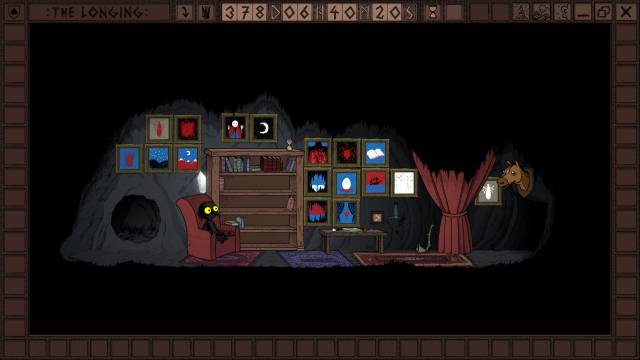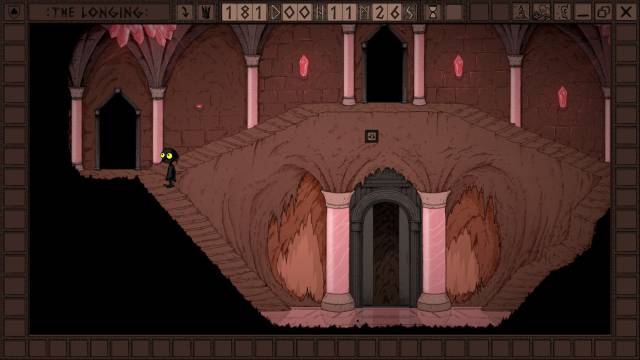
We analyze The Longing, a peculiar mix between idle game and adventure game that will equally test our desire for exploration and our patience.
It is curious to analyze the proposal of a title as personal as The Longing at such a critical moment in our history as it is in which we find ourselves. And it is that in the face of this hard period of confinement to wage this titanic battle against that terrible invisible enemy that is being the COVID-19 virus, this unusual independent title proposes precisely an exercise of supreme confinement and patience in an unconventional development. The Longing, as its name suggests, is about that, to wait patiently for the moment to carry out the task for which we have been created, with the peculiarity, not insignificant, of having to wait 400 days, in real time , to that it happens.
Those responsible for such an unusual proposal are the Germans Stefan Michel, Benedikt Hummel and Anselm Pyta, all of them students from the Baden-Württemberg film academy, who in 2017 formed the small independent video game studio Studio Seufz. The concept behind this video game is strongly inspired by the Teutonic legend of Kyffhäuser, who talks about the lethargy of a king buried under a hill, who waits patiently for the moment of his awakening. The embryo of the project comes from a trip by Anselm Pyta to the town of Kyffhäuser, and even the caverns where we will spend a lot of time in this title are a reflection of the ones Anselm traveled on that trip.
Thus, we are facing a title that combines elements of idle game with development of two-dimensional lateral adventure, controlled with a pointer, and that as we have already mentioned, has the differentiating quality that it takes place in 400 days of real time, and as we will see , the passage of time will be a fundamental factor for certain events to unfold and we can move forward with our adventure. Although his proposal is surprising and very early, and its staging is a priori attractive, we have noted that the title would have appreciated having more locations to visit and more tasks to perform, since after a few hours where said proposal is attractive, we pass to a stage where the title achieves what its creators were looking for: to make us feel alone and to question many things in the face of the harshness of a confinement as hard and long as the one we are facing here. And is that The Longing is an exercise in patience and introspection supreme, whose proposal is certainly not for all audiences.
A shadow confined under the mountain
The story that leads to the title is simple. An ancient king, of Herculean proportions and rocky texture, is on the brink of his last strength. Before retreating into a restful lethargy, he creates a servant, a scruffy little human-shaped shadow, whose task it will be to awaken the king from his sleep after 400 days. Said servant will be the character whom we will control during the long wait that we have ahead. Before plunging into his lethargy, the king warns us that we should not abandon our confinement in the caverns where it rests, and that we must wait patiently for the course of those 400 days past which we must awaken our king.
From this point on, it is up to us to decide how we are going to spend those 400 days. We can explore the wide caverns where we are cloistered, disregard our king's warnings, and seek an escape route to abandon our confinement, or decorate a small cavern that serves as our unfortunate shadow's home. The loneliness of our protagonist is total, and at various moments he will share his thoughts with us, managing to transmit that feeling of supreme solitude and seclusion, in a mixture of cynicism, black humor and deep regret that will make us empathize with our regrettable protagonist. As we have already mentioned, its creators sought precisely that, and in good faith they have achieved it. The Longing at times is more a kind of introspective experience than a game itself. It seeks to convey that feeling of loneliness, of confinement, but also of rebellion and questioning in the face of the imposition of such a long and tortuous wait.

In our investigations through the caves we will delve into the information on the background of the story, although this information is scarce and rather suggested, without going too deep at any time, although it manages to weave a halo of mystery appropriate to the situation. We will also discover certain aspects of our protagonist through various forms, for example with a kind of diary that he keeps in the cave that serves as his home, where among other things we will discover his strange fascination with lice. In any case, the story is more an excuse for the experience than an end in itself, so do not expect a complex plot or surprising revelations, although as we have already mentioned, the game knows how to transmit what you are looking for with great precision.
Patience is the weapon
At a playable level, The Longing adopts a pointer control approach, using the left button to move, and the right button to interact with those elements with which we can do it, counting that itself with a single interaction action in each case. The movement of our character is more than slow, showing great parsimony, a decision made to reinforce that feeling of "longevity" and the sensation of the passage of time. This control could be a little more polished, making it sometimes difficult to direct our character wherever we want. To facilitate the task of exploration, we can save a certain number of locations that seem prominent to us in a drop-down menu, so that by selecting that location, the shadow automatically moves to it. We can also choose to give it the directive to roam freely through the intricate caves where it is locked.
As already mentioned, the game asks us to wait 400 days, in real time, to fulfill our mission. Time is of vital importance in the development of the title. As in any title of the idle genre, this passage of time continues its flow although we close the game, and of course also, when we turn off the computer. As we will see on our walks through the caves, this passage of time will be vital for certain events to unfold that will allow us to continue our investigations. When we encounter any of these situations, the protagonist shadow will give us a fairly accurate approximation of the time we must wait for something to happen. Thus, for example, it will take two hours for that door that has been closed for eons to open, a week for moss to grow to cushion a fall, or a month for that droplet that falls through a stalagmite to form a water reservoir that allows us to climb that elevation that obstructs our passage. Of course, we emphasize that these periods are real time lapses.

Faced with the discomfort of waiting, and in the middle of our explorations through the cave, we discovered a vital detail, which allows us to vary the evolution of time. If we decorate and decorate the small cavern that serves as our protagonist's home, time will flow faster while he is there. So, if we decorate the walls with pictures painted with the various pigments that we find in the caves, decorate their walls and floors with curtains and rugs, expand it or even build ourselves a comfortable bed to rest on, we will see how the passing of time accelerates . We have managed to accelerate this flow by around 15, so the 400 days have finally passed in 35-40 real time. We even have the option of opting for other endings and waiting for us for 400 days, although this also requires a long time. We can also find books to read, real and complete, such as "Thus spoke Zarathustra", in English yes. As long as we are comfortable and entertained in our home (note, only in our home cave, if we leave it, the flow of time will return to normal in real time), the hours will pass faster. Returning to the tragic situation we are going through, we are undoubtedly faced with a metaphor of rabid news. The more comfortable we are in our homes and the more and better our intellects are busy and distracted, the faster this painful confinement to which we are subjected will pass.
After a start where the game offers us various possibilities of exploration and it seems that we will be entertained for a long time, we will see that in a couple of not too long sessions we will visit practically all locations, except for those for which we have to wait a certain amount of time, as already discussed. Unfortunately, the game doesn't offer us much to do to keep us busy during the wait either. In addition, the rhythm with which everything happens is parsimonious to the extreme, making the mere fact of moving to an area not too far away suppose a colossal exercise of patience. In addition, at first it seems that with the passage of time things will happen in the caves, so our first walks we will do with the illusion of seeing what is changing. We will soon discover that this is nothing more than an illusion. We liked the proposal of the title, and it has made us experience unique sensations with a video game, but we would have been very grateful if it offered something else. Of course, we always have the option, totally valid, to run the game a first and only time, and return to it after 400 days to wake up the king, although we understand that it would not make much sense. To highlight, the correct translation into Spanish of all the texts of the title.

Visually The Longing is committed to a sober approach, using ocher tones and a staging as if it were canvas. The animations are somewhat robotic and schematic, but they correctly fulfill their function, although as already mentioned they are parsimonious to the extreme. The sound effects help create atmosphere in our deep confinement, and the sound accompaniment is melancholic and evocative, although it ends up repeating itself a bit. The technical finish of the title is correct and fulfills its function, which is to serve as a wrapper for a different and risky proposal. As we have already mentioned, we are not facing a game for everyone. We are facing a sort of exercise of reflection and experimentation, which surprises and catches initially, but soon it is somewhat weighed down by the lack of incentives and tasks that it offers us to cope with the long wait that it offers us. Its objective is to transmit to us a supreme feeling of solitude, confinement and the hardness of the passage of time, and good faith that achieves this.
CONCLUSION
The Longing is a truly personal and risky proposition. This curious mix between idle game and adventure game invites us to wait 400 days of real time (which will pass the same whether we leave the game or turn off the computer) to fulfill our mission to awaken a powerful king from his restorative torpor. It invites us to explore caves and wait, since many events occur after the passage of time, hours and even months in some cases. We can speed up time, or opt for other endings that do not involve waiting 500 days, but that take time as well. The beginning becomes attractive, and of course it is a different proposal. However, the parsimony with which any action occurs and the subjection of the development of adventure to the passing of time end up turning it into an exercise in supreme patience, which is certainly not for everyone or for all occasions. It successfully manages to convey that feeling of solitude and confinement that its developers wanted to instill in us, but we would have appreciated if the title offered us more possibilities to pass this long wait. A different title that is more like an exercise in introspection than a video game itself, recommended for those looking for a special proposal away from more commercial products. And without a doubt, a very appropriate metaphor for the times of crisis we are experiencing.
THE BEST
- It offers a unique and personal proposal.
- Taken as an exercise in experimentation, it manages to transmit a sense of solitude and confinement in a masterful way.
WORST
- It doesn't offer much to do during the long wait ahead.
- Few locations to visit.
- The slow pace to the extreme of everything that happens on screen.
- It demands supreme patience. It is not a title for everyone or for all situations.
